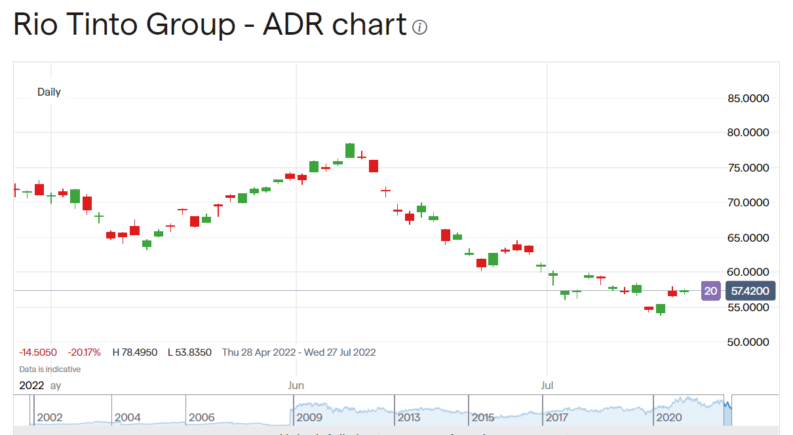- Rio Tinto has just been fined and charged by the Australian taxman
- However, even $600 million, or the total $1 billion, charge isn't really material
- Rio is so large that these sorts of sums, over a decade, are rounding errors
Rio Tinto (NYSE: RIO) stock is pretty much unmoved on the story that they've had to pay $600 million and change to the Australian tax office. That brings their total dunning by the taxman up to $1 billion. The reason that this hasn't moved that stock price is because – vast sum though it is – it's not really material to a company of Rio Tinto‘s size. Which is an interesting and useful comment on just how large RIO actually is. This also explains why problems at the Serbian lithium project, previously announced, simply didn't change the RIO stock price – it's just not a large enough project to make a difference to such a behemoth.
The actual story is that Rio Tinto ran the sales of certain of its Australian sourced commodity production through a sales office in Singapore. But tax on the profits – and to a certain extent the royalty taxes on the Ricardian rents as well – would be based upon the profits made in Australia. By upping the margin assigned to the Singapore retailing operation those profits, thus taxes, were reduced. After something of a long fight that allocation has been successfully challenged. So, Rio Tinto shareholders are poorer by that accumulated and overall $1 billion.
But the issue goes back to 2010. So we're talking about under $100 million a year. Rio's profits are at the $20 billion a year level – it's variable so no more detail than that required – and so it's really not all that material a figure. O.5%, sure, a billion is a billion but 0.5% is the sort of number that's within accounting error levels.
 Rio Tinto Stock Price from IG
Rio Tinto Stock Price from IG Also Read: How To Invest In Metals Stocks
If the depredations – or entirely due societal contributions – of the taxman don't particularly matter to Rio Tinto's stock price then what does? The correct answer being the iron ore and copper prices. That's the majority of the Rio business and those are therefore what really matter.
At which point we can think either way about Rio Tinto's prospects. Perhaps the Chinese construction boom – the thing really driving the Pacific iron ore trade – is going to come to an end as all the developers go bust. Well, maybe, and that would certainly be a negative for Rio. On the other hand we might think that India is about to go through that same Chinese development process and keep the iron ore cycle going.
We can also think about the copper price. The EV and renewables revolution is certainly increasing demand for copper. We might be at the start of the supercycle there, certainly some are predicting it. On the other hand copper has come down at least 30% off its recent peaks on worries about inflation and the interest rate reaction to it – will central banks engineer a recession to kill off the inflation?
The real determinants of the Rio Tinto stock price therefore being these macroeconomic factors – which makes sense, the company is so large that it is really only macroeconomic factors which are going to affect it.